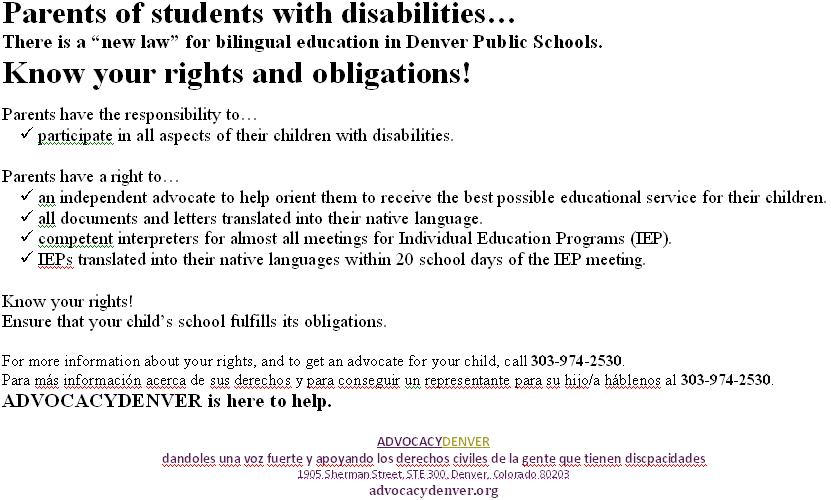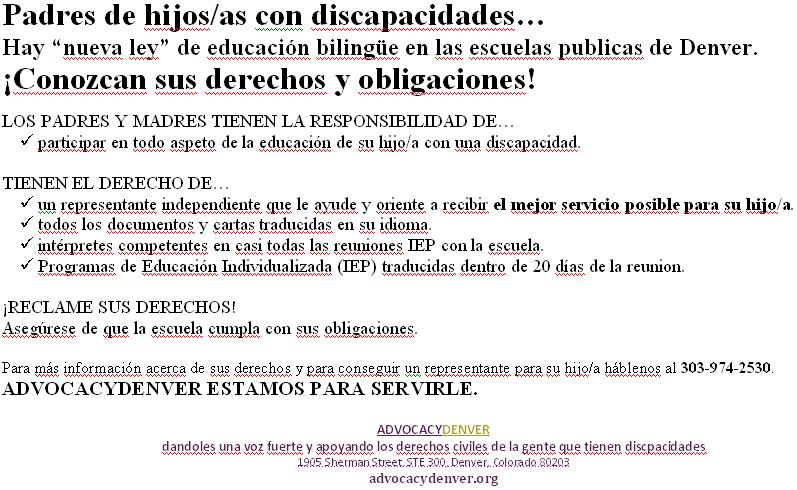By: Shira Wakschlag, Director of Legal Advocacy & Associate General Counsel of the Arc
On January 31, 2017, President Donald Trump nominated Judge Neil Gorsuch of the Tenth Circuit Court of Appeals for a seat on the U.S. Supreme Court. Judge Gorsuch’s confirmation hearing before the Senate Judiciary Committee is set for March 20. A close review of Judge Gorsuch’s opinions pertaining to people with disabilities reveals a jurist with an exceptionally narrow view of the protections offered by federal disability rights laws—an approach that has led to deeply troubling results for members of The Arc in the Tenth Circuit’s jurisdiction. While Judge Gorsuch is a staunch proponent of the inherent dignity of all human beings, including those with disabilities, during his tenure on the Tenth Circuit he has not been a champion for robust enforcement of disability rights laws that are so crucial to enabling individuals with disabilities to lead dignified lives in the community, free from discrimination.
In cases involving the Americans with Disabilities Act (ADA), Individuals with Disabilities Education Act (IDEA), the Rehabilitation Act, and the Fair Housing Act in which Judge Gorsuch authored the majority or concurring opinion, he almost always ruled against the plaintiff with a disability. Perhaps the most common thread uniting these opinions is Judge Gorsuch’s strictly textualist approach to interpreting laws. This approach leads him to frequently disregard legislative history and Congressional intent in favor of deciphering the “objective” meaning of the law’s text in a vacuum, ultimately resulting in very narrow interpretations of the protections guaranteed by federal disability rights laws.
For example, in Hwang v. Kansas State University (2014), the plaintiff, a professor who had been employed by the university for 15 years, requested to extend her 6-month medical leave for a finite period. Due to a cancer diagnosis and weakened immune system, she sought to avoid a flu epidemic that arose on campus. When her employer refused to make an exception to its 6-month leave policy, the plaintiff sued, alleging disability discrimination under the Rehabilitation Act. Judge Gorsuch found for the defendant employer on the grounds that, as a matter of law, a leave of more than 6 months was not a reasonable accommodation. In this opinion, Judge Gorsuch demonstrated a troubling view of disability accommodations in the workplace, implying that the plaintiff employee was seeking not to work and should therefore be funneled into the public benefits system rather than the workplace:
Ms. Hwang’s is a…problem other forms of social security aim to address. The Rehabilitation Act seeks to prevent employers from callously denying reasonable accommodations that permit otherwise qualified disabled persons to work—not to turn employers into safety net providers for those who cannot work.
Remarkably, Judge Gorsuch affirmed dismissal of the case prior to fact discovery, thereby precluding the plaintiff from the ability to present evidence. He also failed to engage in the individualized inquiry required in such cases, in conflict with U.S. Supreme Court precedent, guidance from the Equal Employment Opportunity Commission, and four other circuit courts (in addition to a prior conflicting decision within the Tenth Circuit). An amicus brief on behalf of several disability rights advocacy groups requesting a rehearing referred to the decision as “unprecedented.”
Another standout case is Thompson R2-JSchool District v. Luke P. (2008), in which Judge Gorsuch articulated an extraordinarily low standard for educational benefit that is now under review before the U.S. Supreme Court in another case arising from the Tenth Circuit, Endrew F. v. Douglas Cty. Sch. Dist. Re-1. In Luke P., the hearing officer, administrative law judge, and the district court found for the student, noting that the district had failed to provide a free appropriate public education as demonstrated by the student’s inability to generalize the skills he learned at school to settings outside of school. These decisions were based on the notion that this level of minimal progress towards IEP goals was not enough to constitute a meaningful educational benefit under the IDEA. Judge Gorsuch disagreed:
[A] school district is not required to provide every service that would benefit a student if it has found a formula that can reasonably be expected to generate some progress on that student’s IEP goals…Rather, [the IDEA] much more modestly calls for the creation of individualized programs reasonably calculated to enable the student to make some progress towards the goals within that program.
In finding for the school district, Judge Gorsuch rejected the plaintiff’s argument that the purpose of the IDEA, as stated clearly by Congress, was to help students with disabilities achieve more meaningful progress that led to a greater possibility of independent living. Despite legislative history to the contrary, Judge Gorsuch noted that independence was not an outcome-oriented guarantee of the law. In November, along with a large coalition of disability advocates, The Arc submitted an amicus brief before the U.S. Supreme Court challenging this same low standard employed by the Tenth Circuit in the Endrew F. case. In another IDEA case, A.F. v. Espanola Public Schools (2015), where Judge Gorsuch found for the school district, the dissenting judge noted that the outcome “was clearly not the intent of Congress and…harms the interest of the children that IDEA was intended to protect.”
Judge Gorsuch has also demonstrated a narrow view of class actions, a crucial tool for individuals with disabilities to enforce their rights in court. For example, in Shook v. Board of County Commissioners of County of El Paso (2008), Judge Gorsuch affirmed the denial of class certification to a group of plaintiffs alleging that jail conditions for prisoners with psychiatric disabilities violated the Eighth Amendment’s ban against cruel and unusual treatment. In so finding, Judge Gorsuch reasoned that it would be too difficult to craft appropriate systemic relief for the class as a whole given the variety of psychiatric disabilities represented in the class.
These decisions are more than just abstract discussions of legal theories – they have real-life consequences for The Arc’s constituents. In particular, Judge Gorsuch’s effectively pro-school district stance has been devastating for students with disabilities and special education advocates in the Tenth Circuit. Advocates from AdvocacyDenver (a chapter of The Arc), noted that the Luke P. decision was “seismic” for students with disabilities in Colorado, leading school districts to believe that they had a champion in the Tenth Circuit. This dramatically changed their approach to IEP disputes and empowered them to act to the detriment of students with disabilities under the belief that they would almost always prevail in court. Overall, advocates from the chapter noted that the Tenth Circuit offers some of the weakest protections for students with disabilities and their families in the country and that Judge Gorsuch’s decisions on the IDEA have had deeply problematic results for special education advocates and students with disabilities in Colorado.
On the other hand, Judge Gorsuch, like The Arc, is a staunch opponent of physician-assisted suicide. While he has not yet addressed this issue in court, Judge Gorsuch authored a 2006 book, The Future of Assisted Suicide and Euthanasia, in which he notes that: “[a]ll human beings are intrinsically valuable…any line we might draw between human beings for purposes of determining who must live and who may die ultimately seems to devolve into an arbitrary exercise of picking out which particular instrumental capacities one especially likes.” Among other reasons for his opposition, Judge Gorsuch links the practice to the history of societal devaluation of people with disabilities embodied by the eugenics movement, flagging the inherent risk for abuse the system poses for people with disabilities.
Judge Gorsuch’s views on this subject and his recognition of the inherent dignity of people with disabilities reflect an important area of common ground. The question is whether his jurisprudence will ever link this belief in inherent dignity with a robust protection of rights that is so crucial to the ability of people with disabilities to learn, work, and lead dignified lives in the community among their peers. During his tenure on the Tenth Circuit, the answer to this question has largely been no.
More information about Judge Gorsuch’s majority and concurring opinions relating to disability rights can be found here.
This article was originally published on the blog of The Arc, AdvocacyDenver’s national parent organization.
Accepting applications for Advocate for Transition Services, Juvenile Justice, and Policy Development
AdvocacyDenver is now accepting resumes for our Advocate for Transition Services, Juvenile Justice, and Policy Development position
Job Description
- Work with the courts, education system, and providers to develop positive plans for individuals with disabilities residing in Denver who are involved with those systems.
- Provide individual advocacy for children and young adults with disabilities in Denver between the ages of 15 and 22.
- Take the lead on initiating and participating to improve services for these individuals and maximize their civil rights.
- Analyze and advise the Board of Directors and Staff on Legislative initiatives or rule changes in regard to these issues.
- Other duties as assigned by the Executive Director.
Position requirements
- Must have the ability to work flexibly with various individual circumstances and have the judgment necessary to establish appropriate limits, as necessary.
- Knowledge of the juvenile justice, education, Developmental Disability, and Mental Health systems.
- Demonstrated conflict resolution skills.
- Relevant degree, certification, or 5 years of experience; parent and client training experience is a plus.
- Being bilingual is not required, but will be taken into consideration
Compensation
Salary range to start at $32-34k annually. Benefits include health, dental, vision, paid time off, paid holidays, 401k, and more available.
To apply:
Please send your resume to advocacy@advocacydenver.org before 12/31/13. Interviews will be held in January.
New bilingual education laws in DPS
2013 Colorado Legislative Committee Schedule
Follow the link below for a PDF of the 2013 House Committee schedule:
Follow the link below for a PDF of the 2013 Senate Committee schedule:
2012 Voter Guide on Disability Issues
Follow the link below to access the 2012 Voter Guide which outlines issues ranging from Medicaid, to juvenile justice, to pending federal legislation that all affect the community of individuals with intellectual and/or developmental disabilities. Use the guide to contact candidates for both Colorado legislature and U.S. Congress to raise awareness about these issues.
2012 AdvocacyDenver Voter Guide
Don’t forget to vote on Election Day on November 6th, 2012! Our voices count!
Action Alert: Stop Children From Being Tried as Adults!
March Is the Month to Make Your Mark
Thanks to the advocacy efforts of The Arc in the 1980s, President Ronald Reagan officially declared March to be Developmental Disabilities Awareness Month in 1987. For nearly a quarter of a century, The Arc and its network of 700+ chapters across the country, including AdvocacyDenver, have fostered respect and access for individuals with intellectual and developmental disabilities. We have made tremendous progress in promoting and protecting the rights of people with I/DD and creating opportunities for them to live, learn and work as valued members of their communities. But there is much work left to do.
In 2012, a pivotal national election year, we are fighting to protect support systems in the face of tough economic times and drastic budget cuts. Since many people with disabilities rely on publicly funded services to fully participate in their communities, policymakers and candidates need to know you concerned about continuing these vital services. Take advantage of Developmental Disabilities Awareness Month to make your mark on this election by getting involved and getting active today.
What Can You Do?
• Jump in. Contact AdvocacyDenver to volunteer or donate.
• Speak out. Contact your legislator or candidate today and let them know you expect them to support public policy to assist people with I/DD.
• Spread the word. Educate yourself about issues important to the I/DD community then tell the world what you found out. Use March as a great excuse to post your positive thoughts about the I/DD movement on your Facebook page or Twitter account. Follow AdvocacyDenver on Facebook and Twitter and express yourself. Or go “old-school” with a good, old-fashioned letter to the editor of your local newspaper explaining to your community why they should care about I/DD.
Join us during March to help raise awareness. Find out more about I/DD and what you can do at www.advocacydenver.org today!
Personal Tragedy Drives Support for House Bill 1085

How does HB 1085 affect the well-being of this particular population?
“It will give equal access to our justice system. Right now a developmentally disabled person who’s been sexually assaulted often doesn’t know to call 9ll. Most of the time these people are taken care of by someone else – a guardian, and so when they do tell someone that they have been harmed, typically it’s not going to be to the police right away. It’s just not in their mindset to do that. They’re going to tell someone else about that crime. And right now – when they tell someone, that information, that statement is not permissible in a court of law. So basically, what 1085 will do, it will allow the opportunity for those statements they made in a safe environment, to someone they trust, to be considered. Then the judge still has to determine if it has reliability and merit. So it’s not automatic. It still has to go through a variety of different channels. But prior to this bill there wasn’t any access for those statements to be entered into a courtroom setting. And so because of that, that gives validation to this community that if you are harmed, there’s an opportunity now that the statements that you share with someone else may be considered.”
Why is this particular population so vulnerable to sexual assault?
“You know, I believe it’s because they’re kind of voiceless. Many of them don’t have the same kind of communication that we have – and so their communication is different. And a lot of times people who care for them understand that basically they can’t defend themselves their whole vocabulary is different and I think people who prey on this population know that. They know that that they can probably get away with this kind of crime because statistics say that 42 per cent of those in that population who have been assaulted are assaulted again because they don’t report it. And if they do report it – very few of those times do those trials go on to court.”
How did this bill come to you?
“Good question. It came to me by an advocacy group that has a host of people on it. It has a couple of DA’s on it from the 18th district, also from Denver DA’s , the aurora police department, and the ARC population and they were just looking at what can we do to tighten that loophole when it comes to that population being assaulted because statistics say that 80 per cent of people developmentally disabled people will be assaulted and 32 per cent of men. That’s a high number. And at this point only one percent goes to trial.”
I’ve listened to your arguments on the floor and you are quite passionate and I just wanted to know what it is about this issue that stirs your own personal passions?
“For me it was because of my own personal tragedy. My son was murdered and I was his only voice and presence in the courtroom. He was silent because he was dead. And he was murdered because he was going to be a witness in a trial and so I had to bring voice to his testimony because he was no longer with us. And so that reminded me of this population. This same population doesn’t have a voice, they don’t have an advocate. And so I was glad to be their advocate, so they could have greater access to justice because when someone does something wrong, they should be held accountable for it. And if these people are revictimized over and over again because they don’t have a voice. Then some thing needs to be done to correct that injustice.”
How do the advocates feel that it will affect their work if the bill is passed?
“I’ve gotten such support from the advocacy community because basically I get the impression that this is an area that has just not been addressed. It’s not been something that anyone wants to talk about. Seven other states have this similar law – so Colorado’s not going to be the first. We will be the eighth. Who knows if any other states are considering it but only seven other states have this law. This law is modeled after the same language of the law we have for children who have been sexually assaulted. Now . that law came into place in 1983. It has been vetted and constitutionally it’s sound. So we’re using the same language and verbage for that population. We’re just now making sure that those who are developmentally disabled have the same option.”
For those who say it will be a double edged sword for those who are defending the same population – what is your response to that?
“You know, I have great confidence, in our criminal justice system. The way our criminal justice system is set up is to make sure the scales are balanced and so I’ve sat through court proceedings and anything that’s not considered reliable goes through a variety of different measures and protocols and I have confidence that if it has merit and proves that it can be used in a court of law and can go through all those hurdles, I think it’s going to be just fine. I think our system is big enough and great enough and strong enough to find justice in any situation.”

